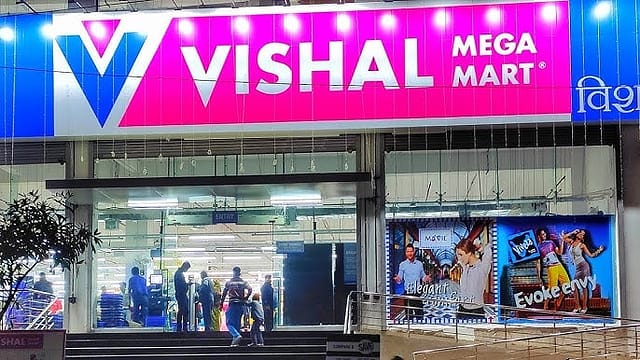How PEs turned a floundering retail venture into a $6 billion reality
ADVERTISEMENT

The sensational Day 1 listing of India's mass-market retail chain, Vishal Mega Mart, with a valuation of $6 billion (₹50,466 crore), offers a fascinating case study on how some entrepreneurial dreams must first die to truly live on.
With over 645 stores across 414 cities, Vishal's presence is ubiquitous in the lives of middle-class and lower-middle-class families, offering everything from clothes priced at ₹99 to essential groceries. Its meteoric rise in recent years has been nothing short of miraculous — behind the buzzing storefronts and towering revenue figures of over $1 billion (₹8,911 crore) Vishal Mega Mart's (VMM) journey is as much about loss as it is about success.
Behind the triumph lies a narrative that began decades earlier with Ram Chandra Agarwal, and his dream of building India's answer to Walmart.
The Big Idea
In the mid-1980s, Agarwal was a young man in Kolkata, scraping by with a photocopy shop that earned him ₹300 a month. Restless and ambitious, he pivoted to the clothing business, where he saw greater potential. Eventually, he moved to Delhi, pooling his savings and borrowing from family to start what would become Vishal Retail. Agarwal's vision was simple but profound: to offer affordable, quality products to India's growing middle class under one roof.
By 2007, his dream took wings, with an IPO that valued the company at ₹2,000 crore. The media likened Agarwal to Sam Walton, celebrating his ability to connect with the aspirations of middle-class Indians. The company's footprint rapidly expanded to include over 2,50,000 square feet of retail space, supported by five factories. Vishal Retail seemed unstoppable.
But success often masks fragility.
Agarwal's expansion was funded by short-term loans, with the expectation that equity infusion would follow. The global financial crisis came as a tidal wave, sweeping away consumer confidence and drying up liquidity. Agarwal found himself floundering with sales plummeting, debt ballooning as his ambitious expansion came undone.
Fall and Rise
By 2011, Vishal Retail was drowning in ₹750 crore of debt. Agarwal, under immense pressure from lenders and vendors, was forced to sell. In a distress sale, TPG Capital and Shriram Group acquired the company for ₹70 crore. For Agarwal, it was a moment of profound personal loss. “I had become very ambitious then, but now I’m more cautious,” he would later say. With ₹10 crore in borrowed money, Agarwal started over, founding V2 Retail — a smaller but determined attempt to rebuild his dream through economically-priced apparels.
While Agarwal forged a new path, Vishal Mega Mart rose like a proverbial phoenix from the ashes.
TPG and later Shriram brought strategic discipline and operational rigor to the ailing retail chain. Costs got streamlined, stores locations got rationalised, and an asset-light model shaped the company's resurgence. By 2017, Vishal Mega Mart had over 350 stores and consolidated sales of ₹2,300 crore. The company's transformation was well underway.
In 2018, Kedaara Capital and Partners Group acquired VMM for $350 million. At the time of the deal, Nishant Sharma, co-founder and partner, Kedaara Capital, said: "We are delighted that having essayed a remarkable evolution of the VMM business thus far, Gunender has chosen to join hands with Kedaara and Partners Group for the next phase of VMM’s growth to reinforce its position as a market leading business." With this acquisition, the company entered its most profitable phase.
The new owners, led by Gunender Kapur, CEO and managing director, focused on underserved markets in smaller towns and cities, where VMM became a trusted name for aspirational yet value-conscious consumers. Kedaara's strategy emphasised operational efficiency and a highly scalable model, propelling the company to unprecedented heights.
Today, the retail chain boasts of a robust private brand portfolio, contributing nearly 74% of revenue, including 100% in apparel, its largest category, with 25 crore garments sold annually. Its loyalty program, with 13.6 crore registered customers, accounts for 92% of business revenue. The company has also piloted a quick commerce platform offering 2-hour deliveries within 8–10 km, with free delivery above ₹299. With a profit after tax of ₹460 crore (5.2% of revenue), Vishal has generated ₹3,000 crore in free cash flow over FY22–Q1 FY25. Unlike the story of the past, it has zero debt with strong cash reserves of ₹700 crore.
Not surprising that the Street lapped up the story with gusto, with the stock debuting at a premium of over 40% on its issue price of ₹78.
Yet, the success that Vishal Mega Mart enjoys today no longer belongs to its founder. While Kedaara has gone laughing all the way to the bank, Kapur too has hit paydirt with his stake in the company valued at over ₹1,000 crore. While the private equity firms deserve credit for their strategic vision and operational expertise, the irony remains that the man who dreamed it all into existence is no longer part of its narrative. Instead, Agarwal continues his journey with V2 Retail, a smaller but a scaled-down homage to his original vision.
The King Is Dead, Long Live The Legacy!
The rag-to-riches, blunder-to-triumph story of Vishal Mega Mart could make for a compelling case study at business schools. It demonstrates the transformative power of private equity — how strategic interventions can resurrect even the most distressed assets. TPG and Shriram’s revival efforts, followed by Kedaara Capital’s scaling strategies, turned the company into a retail juggernaut.
It is also a sobering reminder of how the spoils of such transformations can bypass the original creators. Yet, Agarwal’s journey is a testament to the resilience of entrepreneurial spirit - despite losing the crown jewel, he proved that dreams may falter but they seldom die. His current venture, V2 Retail, is valued at ₹5,600 crore, with Agarwal holding over 54% (₹3,024 crore) stake.
In many ways, Vishal Mega Mart's saga is a bittersweet reminder that sometimes dreams turn into reality — not for those who envisioned them, but for those who tilled on it.